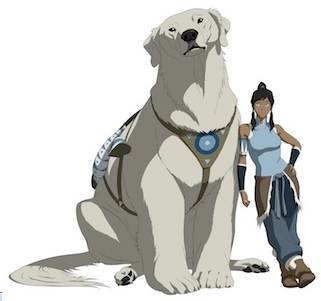
Before we begin, I'd like to welcome myself back to blogging. My last semester just ate me up, so I put this on the backburner for a while. I'm back now, and I've got some things I want to write about.
During that last semester, though, I managed to catch the early release of the first two episodes of The Legend of Korra, sequel to Avatar: The Last Airbender. Mike and Bryan, you magnificent bastards, you had me looking forward to a sequel, and the first two episodes look promisingly good, so much so that I'm not looking all that deeply at it.
It helps that the Avatar universe had a ready-made sequel hook, instead of the creators having to haphazardly invent one when enough money is made: the Avatar, master of all four elements, is constantly reincarnated in a cycle, manifesting in one of the four nations in sequence. After Aang, the titular Airbender, is Korra, a girl born into the Southern Water Tribe. At seventeen, Korra has mastered earth, fire, and water, but lacks the "spirit" needed for air. The hope is that Tenzin, the adult son of Aang and an airbending master, can teach her.
Another thing that Korra does well as a sequel is that it does not spend too much time mooning over the older cast, or what might remain of it. Since there is a new Avatar, Aang is deceased, and a few other characters are said to be dead, too. The only one we see is the elderly Katara, now a grandmother. These characters are treated with gentle reverence, but it is clear that their story has been told, and they will not be overworked. This series knows when to let characters go.
The more obvious distinction is that Korra is meant to be the polar opposite of Aang. Though Aang was undoubtedly heroic, he was (literally) small and unsure of himself, and had a quiet air inspired by Tibetan Buddhism. Korra is (literally) big and brash, and loudly confident. She has mastered all the elements except air, while air was the only thing that Aang knew at first. This means that Korra's quest will involve something new, that the creators will be keeping their work fresh instead of retreading it. It was already obvious that each Avatar was a very different person, but in this case it helps to further separate the sequel from the original.
So, how does the series stack up in execution? In lesser hands, the character of Korra could have been insufferable. If she already knows three elements, there is a source of conflict removed. Headstrong characters in children's television also tend to have it laid on too thick, becoming complete idiots in the process.
Just because a series is designed for kids doesn't mean its characters have to be idiots, though, and Korra is a pretty cool gal. She makes a lot of stupid mistakes, but is a genuinely kind person who wants to do well. She has nuance and some degree of self-control, which go a long way towards making her likable.
Tenzin is obviously meant to form an odd couple with Korra, creating another new source of conflict. This predictable dynamic becomes effective, however, when it's clear Tenzin still has respect for Korra, which gives his interactions with her a quiet dignity. Like Korra, it would have been easy to make Tenzin into a caricature or in this case a one-dimensional "wise old mentor" but he seems more intelligent and worldly than that.
Also, Tenzin is a husband and father. While he's not the protagonist, the way that his family are all developed as distinct characters in their brief screentime, and the fact that Tenzin's family life isn't treated as a hurdle, might hopefully encourage more media creators to be less averse to writing characters as families and parents. Come to think of it, against a lot of common wisdom, Korra's parents are both alive, too, and this could provide new dynamics that other cartoons have avoided: we'll see.
The two brothers aren't that interesting so far, but at t his point I have faith that they'll pick up. Overall I love the world-building going on here: I find the advances in technology credible, and they serve to further distinguish the series as well as looking cool. Add the anti-bending movement and the bending sports, and this feels like a transformed, and even more importantly, a lived-in world, one that comes alive, and is bigger than what's in front of the main character's noses. That was true of the original series, too, and one of the main reasons why it reminded me of an epic fantasy novel brought to television.
So yeah, I'm excited to see more of this show. It's not beholden to the older series, doesn't take the easy way out with characterization, and you know what…I find the pilot more intriguing than that of Avatar. They both have a lot of clichés, but Korra seems to play around with that more immediately.

No comments:
Post a Comment